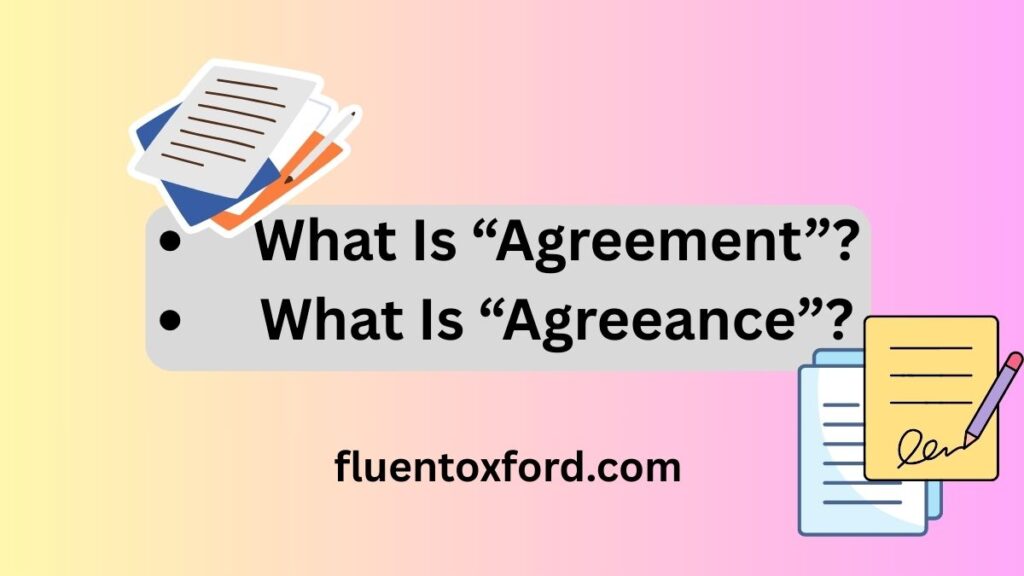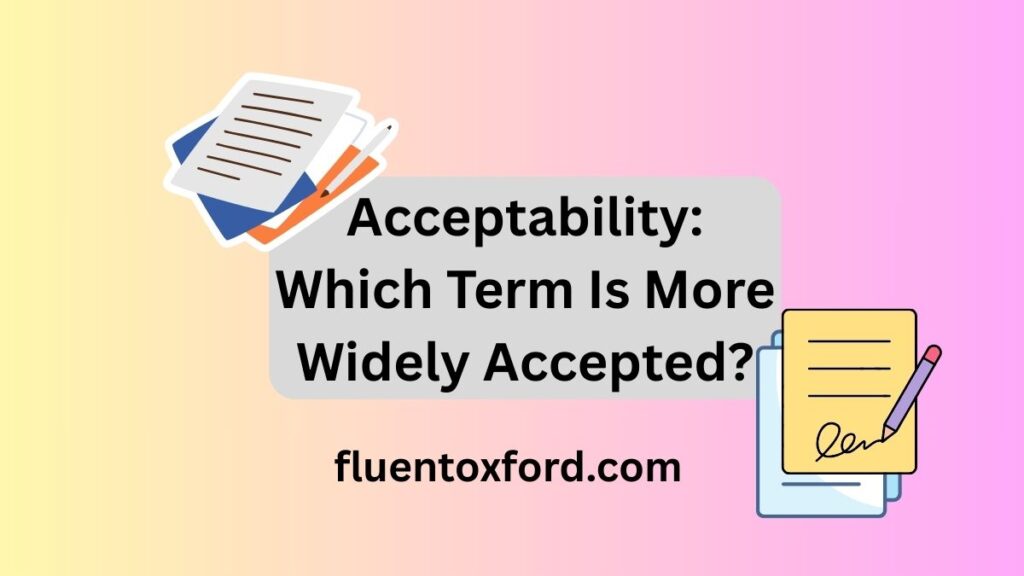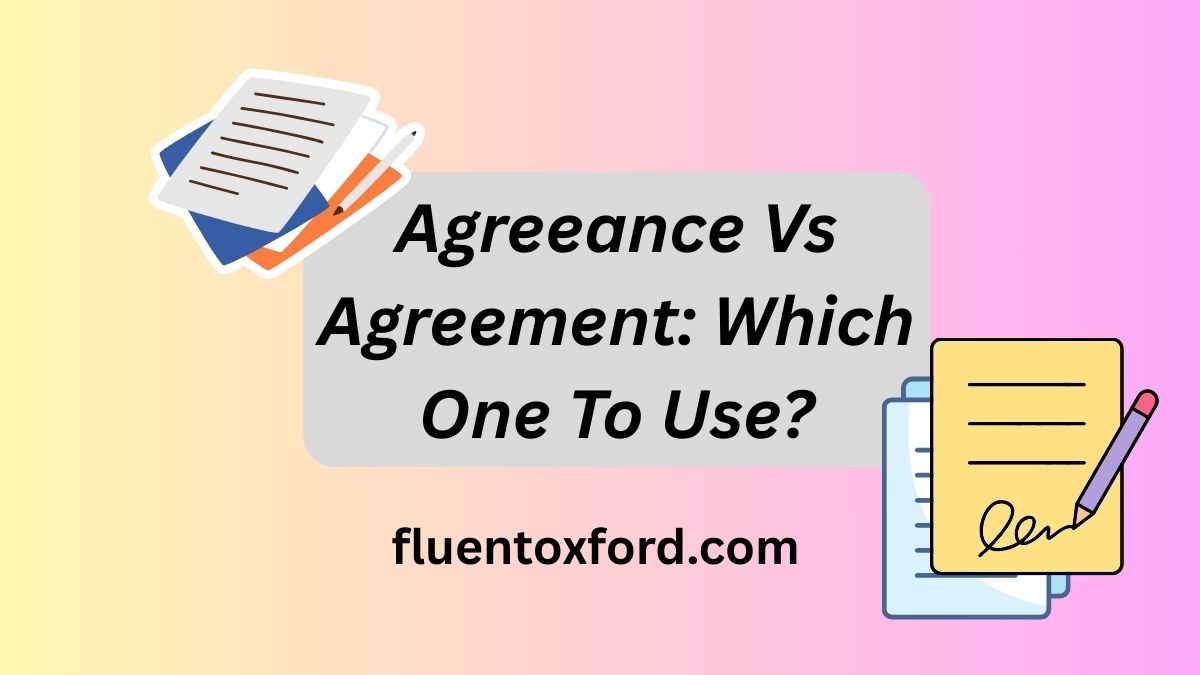In the realm of English vocabulary, the phrase “Agreeance vs Agreement: Which One to Use?” centers around two terms that appear similar but diverge significantly in usage and frequency. Agreeance is an archaic or rarely used noun that refers to the state of being in agreement, whereas agreement is the widely accepted and modern term used to signify mutual understanding or a formal arrangement between parties. Although both stem from the verb agree, their relevance in contemporary language differs greatly.
Language evolves, and so does the preference for certain words over others. Readers often encounter unfamiliar or outdated terms and wonder about their correctness, especially in formal writing or professional communication. That’s where the intrigue of “Agreeance vs Agreement: Which One to Use?” lies. The curiosity of uncovering whether one word has a rightful place in modern English or is simply a relic of the past makes this topic both practical and fascinating.
Exploring the differences in tone, formality, and usage context between these two words sheds light on how language choices can shape clarity and professionalism. The debate around “Agreeance vs Agreement: Which One to Use?” encourages a deeper look into word history, grammar accuracy, and current usage trends. By understanding the nuances behind “Agreeance vs Agreement: Which One to Use?”, readers gain valuable insight into making more confident and effective word choices.
Quick Answer: Should You Use “Agreeance” or “Agreement”?
You should use “agreement” instead of “agreeance.” Agreement is the widely accepted and modern term, commonly used in both formal and informal contexts. Agreeance is considered outdated and rarely seen in contemporary language. To ensure clarity and professionalism, stick with “agreement” in most situations.
Here’s the short version:
- ✅ Use agreement—it’s the standard, widely accepted, and formally recognized term.
- ⚠️ Avoid agreeance“—it’s rare, considered dated or awkward, and often flagged by editors or grammar tools.
Unless you’re aiming for a quirky or archaic tone in casual speech, agreement is almost always the better choice.
Definition and Meaning: What Do These Words Actually Mean?

Let’s first unpack what each word really means. While they stem from the same verb—to agree—they aren’t interchangeable in modern English.
What Is “Agreement”?
According to Merriam-Webster, an agreement is
“A harmony of opinion, action, or character; the act or fact of agreeing.”
An “agreement” is a mutual understanding or arrangement between two or more parties, often formalized in writing. It can refer to a contract, a shared decision, or a harmonious state of being. In essence, it signifies consent or alignment on specific terms or conditions. It can refer to:
- A contract between parties
- A shared understanding between people
- A general state of agreement
Common contexts include:
- Legal documents
- Business deals
- Informal conversations
- Political alliances
- Emotional connections
What Is “Agreeance”?
“Agreeance” is far less common. Here’s how the Oxford English Dictionary defines it:
“The act of agreeing; consent or concurrence.” (Marked as archaic or rare.)
“Agreeance” is a rarely used and outdated noun that means the state of being in agreement. While it shares the same root as “agreement,” it is not commonly accepted in modern English. Most writers and speakers prefer “agreement” for clarity, correctness, and wider recognition.
You might see it in:
- Historical documents
- Poetic or rhetorical contexts
- Casual or regional dialects
- Rarely, corporate or business jargon trying to sound fresh (but often sounding odd)
Usage Comparison: Agreeance vs Agreement in Practice
The difference between agreeance and agreement isn’t just stylistic—it impacts how your writing or speech is perceived.
Examples in Sentences
| Sentence | Natural or Not? | Why |
| “We reached an agreement after hours of negotiation.” | ✅ Yes | Standard usage |
| “There was growing agreeance among the board members.” | ⚠️ Uncommon | Sounds unusual or dated |
| “Our handshake was a sign of our agreement.” | ✅ Yes | Normal in formal and informal settings |
| “We came to an agreeance over dinner.” | ❌ No | Awkward phrasing |
Agreement fits smoothly into most situations. Agreeance, by contrast, often disrupts the rhythm of a sentence.
Tone and Register: Formality Matters
Word choice often reflects tone and register (how formal or informal the language is).
| Word | Formal Writing | Casual Speech | Business Settings | Legal Documents |
| Agreement | ✅ Excellent | ✅ Common | ✅ Preferred | ✅ Required |
| Agreeance | ❌ Rarely used | ⚠️ Occasionally heard | ⚠️ Can sound awkward | ❌ Avoid entirely |
When clarity and professionalism are key, agreement is the safer bet.
Acceptability: Which Term Is More Widely Accepted?

A quick look at Google Ngram Viewer, which tracks word usage across books, shows that
- Agreement appears thousands of times more than agreeance.
- Agreeance saw some usage in the 1800s, dipped, and only recently shows a tiny uptick—mostly in error or casual use.
Corpus Analysis Insight
Corpus data from the Corpus of Contemporary American English (COCA) shows:
- “Agreement” appears over 38,000 times.
- “Agreeance” appears fewer than 40 times—often in niche or non-edited contexts.
Conclusion: There’s no contest. Agreement is the dominant, preferred term.
Why the Confusion? A Linguistic Breakdown
So why do people still use agreeance?
Common causes include:
- Morphology Misfire: It looks like a plausible noun form of “agree” (like appearance from appear).
- Sound Pattern Bias: It mirrors real words like “allowance” or “clearance.”
- Language Barrier: Non-native speakers might coin it while learning English.
- Pop Culture or Social Media: Phrases catch on regardless of correctness.
- Word Sense Disambiguation: People assume the meaning from the root verb and context.
Linguistic Notes:
- The rise of “growing agreeance” in speech mimics trending jargon, not formal evolution.
- From an NLP (natural language processing) view, this is a case of synonym drift—where two words seem like synonyms but only one is correct.
Etymology: The Origins of “Agreeance” and “Agreement”
The word “agreement” comes from Middle English and Old French, rooted in the verb agree. It has been widely used since the 14th century. “Agreeance,” also derived from agree, appeared later but remained uncommon. Over time, agreement became the standard term, while agreeance faded from regular usage.
Understanding where these words come from helps clarify their roles.
Agreement: A Linguistic Legacy
- Origin: Middle English, from Old French “agreer” (to please, to agree), which comes from Latin “adgratare.“
- First recorded use: 15th century
- Became standard in legal and diplomatic language during the Renaissance
- Global Standardization: The term “agreement” is recognized and used consistently in international treaties, trade deals, and global diplomacy, making it a universal term in cross-border communication.
- Legal Codification: It appears in thousands of legal texts and contracts worldwide, firmly establishing its status as a foundational term in both civil and common law systems.
Agreeance: A Linguistic Anomaly
- First used in 16th century, but usage faded by the 1800s
- Rarely found in published works
- Brief revival attempts in corporate or spoken language, but never stuck in formal writing
- Revival Attempts in Media: Occasional usage in TV shows, online forums, or corporate lingo has sparked brief curiosity, but these attempts rarely lead to long-term adoption.
- Flagged by Grammar Tools: Most modern grammar and spellcheck tools, including Grammarly and Microsoft Editor, highlight “agreeance” as incorrect or suggest “agreement” instead.
📌 Quote: “‘Agreeance’ may exist in dictionaries, but it doesn’t live in real conversations.” — Linguist, Dr. Sarah Morrison
Summary Table: Agreeance vs Agreement
| Feature | Agreeance | Agreement |
| Formality | Informal / Archaic | Accepted in all settings |
| Usage | Rare | Ubiquitous |
| Sound | Awkward | Natural |
| Dictionaries | Present but flagged | Fully supported |
| Professional Use | Avoid | Recommended |
| Example | “We’re in agreeance.” | “We’ve reached an agreement.” |
Real-World Examples and Case Studies

📝 Case Study: Corporate Meeting Misstep
In a tech startup meeting, a junior exec used “in agreeance” during a pitch:
“We are all in agreeance on this product direction.”
The lead investor later commented:
“The pitch was solid, but the word ‘agreeance’ made it feel less polished.”
✅ Lesson: Even if the meaning is clear, awkward word choice can undermine credibility.
The Handshake Analogy
Think of agreement as a handshake—formal, recognized, and clearly understood.
Agreeance is more like a fist bump—informal, unclear, and not universally accepted. The handshake analogy illustrates the difference between the two words: using “agreement” is like offering a firm, professional handshake—clear, confident, and universally understood. In contrast, “agreeance” feels like an uncertain or informal gesture that might confuse the receiver. It lacks the clarity and acceptance needed in effective communication.
That’s the core of the handshake analogy: go for the gesture that matches the situation.
Conclusion
In the end, when looking at Agreeance vs Agreement: Which One to Use?, it is clear that agreement is the better and more common choice. It is accepted in everyday speech, writing, and formal settings. On the other hand, agreeance is rarely used and often sounds outdated or incorrect to many people. While both words share similar roots, agreement is the clear and preferred choice in modern English over the outdated agreeance
To sound clear and professional, using agreement is the safe option. While both words have similar meanings, only one fits well in modern English. So, in the debate of Agreeance vs Agreement: Which One to Use?, the answer is simple—stick with agreement for better communication. Whether you’re writing a paper, sending an email, or having a discussion, choosing the right word matters. Let Agreeance vs Agreement: Which One to Use? remind you that language should always be clear, current, and easy to understand.
FAQs
Q1. Is “agreeance” still used in 2025?
Rarely. While technically a word, “agreeance” is considered outdated and is not widely used in professional or formal communication today.
Q2. Which is correct: “in agreeance” or “in agreement”?
“In agreement” is correct and standard in modern English; “in agreeance” is nonstandard and often discouraged.
Q3. Do any official style guides recommend using “agreeance”?
No. Major style guides like APA, MLA, and Chicago Manual of Style recommend using “agreement” only.
Q4. Is “agreeance” ever acceptable in legal or academic writing?
No. Legal and academic standards universally favor “agreement” due to its clarity and formality.
Q5. Has “agreeance” increased in use on social media or pop culture?
There’s been a slight uptick in casual online use, but it remains informal and often criticized by grammar experts.

As an admin at Fluent Oxford, Maida Queen is the driving force behind our vibrant learning community. With a deep passion for English language education, she ensures that our platform remains a dynamic, engaging, and supportive space for learners worldwide.
Maida expertly manages content, assists users with their grammar and fluency queries, and fosters an interactive environment where learning feels effortless and enjoyable. Whether you need guidance, motivation, or just a friendly face in the Fluent Oxford community, Maida is always there to help you reach your English language goals.








